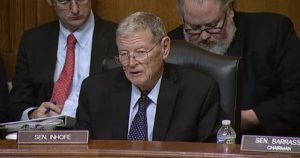
The Environmental Protection Agency’s new Waters of the United States rule, the one introduced by the Obama administration and immediately drew the ire of farm groups nationally, now has the support of those groups.
It also has the support of Oklahoma U.S. Sen. Jim Inhofe because it replaces what he called the “flawed regulation of the Obama Administration.” Inhofe had been a staunch critic of the original plan saying it granted too much authority to the federal government to regulate virtually all waters or wet areas in the U.S.
“We needed a right-sized WOTUS rule,” said Inhofe, ” and that is exactly what President Trump and Acting Administrator Wheeler delivered.”
He said the new rule will clearly define the jurisdiction of the Clean Water Act in a straightforward manner, “alleviating the burden farmers and landowners face under the Obama-era rule requiring them to spend tens of thousands of unnecessary dollars to determine if they need to obtain a federal permit to make improvements to their land.”
Inhofe noted that 32 states and two courts agreed the Obama-era WOTUS rule was deeply flawed “and an illegal land-grab by unelected federal bureaucrats.”
He added that the new rule will help farmers and ranchers and energy products across Oklahoma focus on their business and not red tape.
- On June 27, 2017, Inhofe praised the EPA’s proposed WOTUS repeal.
- On Feb. 28, 2017, Inhofe praised President Trump’s executive order that started to dismantle to the WOTUS rule.
- In September 2016, Inhofe released a report entitled From Preventing Pollution of Navigable and Interstate Waters to Regulating Farm Fields, Puddles and Dry Land: A Senate Report on the Expansion of Jurisdiction Claimed by the Army Corps of Engineers and the U.S. Environmental Protection Agency under the Clean Water Act, which detailed the expansion of the EPA and Army Corps’ jurisdiction under the Obama administration.
- In January 2016, Inhofe joined Sen. Sasse (R-Neb.) in formally requesting that the Department of Justice investigate whether officials at the EPA knowingly violated federal law in its WOTUS propaganda campaign. In December 2015, the Government Accountability Office determined that the EPA violated the law when it used taxpayer dollars for covert propaganda and unauthorized publicity as well as for indirect or grassroots lobbying on WOTUS.
- That same month, Inhofe sent a letter to the EPA requesting feedback on state implementation of EPA regulatory programs, including WOTUS. Inhofe released the EPA’s responses during the March 2016 EPW hearing entitled Cooperative Federalism: State Perspectives on EPA Regulatory Actions and the Role of States as Co-Regulators.
- Congress passed a Congressional Review Act (CRA) Resolution of Disapproval against the WOTUS rule in January 2016. President Obama later vetoed this legislation and the Congress failed to override his veto.
- On Nov. 3, 2015, Senate Democrats blocked consideration of Inhofe’s S. 1140 by a vote of 57–41. The following day the Senate passed S.J. 22 Resolution of Disapproval introduced by Sen. Joni Ernst (R-Iowa) by a vote of 54–44. An additional 15 Senators had publically expressed concerns with WOTUS. Sen. Inhofe criticized the 11 Democrats that voted against the measure, despite signing onto a letter to the EPA asking for clarification of the final WOTUS rule
- In July 2015, Inhofe sent a letter to the Army Corps of Engineers requesting confirmation of information presented to the EPW committee in an internal Army Corps of Engineers document that expressed grave concerns with the rule.
- Despite a number of outstanding concerns, the final WOTUS rule went into effect in June 2015. However, the Sixth Circuit Court of Appeals issued a stay on the rule in October 2015, blocking the final rule from going into effect after being challenged by 32 states.
- The following month Inhofe introduced bipartisan legislation, S. 1140, The Federal Water Quality Protection Act, which would revise the WOTUS rule to no longer include a number of small bodies of water. President Obama threatened to veto this legislation.
- In March 2015, Inhofe joined Sen. Barrasso (R-Wyo.) and 15 other Senators in sponsoring Barrasso’s Senate Budget Resolution amendment limiting the expansion of the WOTUS definition. This amendment passed the Senate by a vote of 59–40.
- After becoming chairman of the EPW committee at the start of 2015, Inhofe joined U.S. Representative Bill Shuster (R-Pa.), chairman of the of the U.S. House Transportation and Infrastructure Committee in calling for the withdrawal of the WOTUS rule following a bicameral hearing on the rule.
- In March 2014 the Obama administration, EPA and Army Corps of Engineers announced a proposal to expand the definition of the waters of the United States in the Clean Water Act from navigable waters to virtually any body of water and wetland. In following months, Inhofe sent a number of letters to the President and EPA urging them to reconsider the rule.





